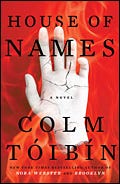House of Names makes the classic Greek legend of Clytemnestra psychologically credible for modern readers within a realistic portrayal of ancient Greece. The legends revolving around the Trojan War tell of King Agamemnon of Mycenae sacrificing his daughter Iphigenia to the goddess Artemis to gain a favorable wind so his army could sail to Troy. His wife, Clytemnestra, took revenge on his return, killing him in his bath. Their son, Orestes, later avenged his father by killing his mother and her lover, and was hounded by the Furies for this act of matricide.
Opening with Clytemnestra's point of view, the novel easily wins sympathy for her when she discovers, too late to stop anything, that her husband intends to kill her daughter. Later, as she searches for the ally she needs to avenge Iphigenia we understand her feelings. Though overpowering, they are not simple. "Food merely whets our appetite," she reflects, "it sharpens our teeth; meat makes us ravenous for more meat, as death is ravenous for more death." When the novel shifts to Orestes' point of view, it moves beyond the legend to weave a believable tale of a boy growing to manhood under oppressive circumstances and developing a hatred strong enough to lead him to murder.
The physical setting is vividly conveyed, along with the feelings and interactions of the characters; sound, scent, light and shadow dominate over visual details. The characters' physical appearance is rarely mentioned, except where clothing or face-paint is a crucial element in a scene. Readers who must "see" the characters to become immersed in a story may be disappointed, but for other readers, the sensory details that are given will compensate abundantly for this lack. It's not necessary to be familiar with the plays of Euripides and Sophocles to appreciate the novel; readers who know the plays will find that House of Names moves beyond them, offering further dimensions of interest and depth. (2017, 288 pages)




